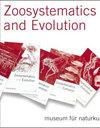Rock island melody: A revision of the Afroedura bogerti Loveridge, 1944 group, with descriptions of four new endemic species from Angola
IF 0.9
2区 生物学
Q2 ZOOLOGY
引用次数: 12
Abstract
Four new species of flat geckos in the Afroedura bogerti Loveridge, 1944 group are described from south-western and west-central Angola. The description of these new species significantly restricts the distribution range of typical A. bogerti, a morphologically very similar species, from which they differ genetically by 5.9–12% divergence for the mitochondrial 16S ribosomal RNA gene. Morphologically and genetically, Angolan Afroedura are divided into two main groups: a mostly south-western coastal group and a west-central inland/highland group. These two groups are further divisible into three and two subgroups respectively, all geographically isolated, differing by a combination of the following features: colouration, average adult size, number of mid-body scale rows, number of scale rows on dorsal and ventral surface of each tail verticil and if nostril scales are in contact or not. All five Angolan species are morphologically distinguishable and in agreement with the molecular results. An updated dichotomous key to the Afroedura transvaalica group is provided. The new discovery adds to a growing number of endemic Pro-Namib reptiles described from Angola in recent years.岩岛旋律:1944年非洲非洲人(Afroedura bogerti Loveridge)群的修订版,附安哥拉四种新的特有种的描述
在安哥拉西南部和中西部描述了4个新的扁壁虎新物种,属于Afroedura bogerti Loveridge, 1944组。这些新种的描述极大地限制了典型的博格氏拟南蝽的分布范围。博格氏拟南蝽是一种形态非常相似的物种,它们与博格氏拟南蝽在线粒体16S核糖体RNA基因上的遗传差异为5.9-12%。在形态学和遗传学上,安哥拉非洲鳄分为两个主要群体:主要是西南沿海群体和中西部内陆/高地群体。这两组分别可进一步分为三个和两个亚组,它们在地理上都是孤立的,根据以下特征的组合而有所不同:颜色、平均成年尺寸、身体中部鳞片排的数量、每条尾巴垂直的背侧和腹侧表面的鳞片排的数量以及鼻孔鳞片是否接触。所有五个安哥拉物种在形态上是可区分的,并且与分子结果一致。提供了一个更新过的Afroedura transvaalica组的二分键。近年来,越来越多的安哥拉特有的亲纳米比亚爬行动物被描述为新的发现。
本文章由计算机程序翻译,如有差异,请以英文原文为准。
求助全文
约1分钟内获得全文
求助全文
来源期刊

Zoosystematics and Evolution
ZOOLOGY-
CiteScore
3.50
自引率
5.00%
发文量
34
审稿时长
16 weeks
期刊介绍:
Zoosystematics and Evolution, formerly Mitteilungen aus dem Museum für Naturkunde in Berlin, is an international, open access, peer-reviewed life science journal devoted to whole-organism biology. It publishes original research and review articles in the field of Metazoan taxonomy, biosystematics, evolution, morphology, development and biogeography at all taxonomic levels. The journal''s scope encompasses primary information from collection-related research, taxonomic descriptions and discoveries, revisions, annotated type catalogues, aspects of the history of science, and contributions on new methods and principles of systematics. Articles whose main topic is ecology, functional anatomy, physiology, or ethology are only acceptable when of systematic or evolutionary relevance and perspective.
 求助内容:
求助内容: 应助结果提醒方式:
应助结果提醒方式:


